
Category Archives: news

MHAction Values and Operating Principles
As part of our organizational launch MHAction is solidifying and clarifying our values and operating principles. These are the same values we’ve held in our work over the past few years, we hope that this document will make them transparent to all of our supporters. MHAction Values and Operating Principles
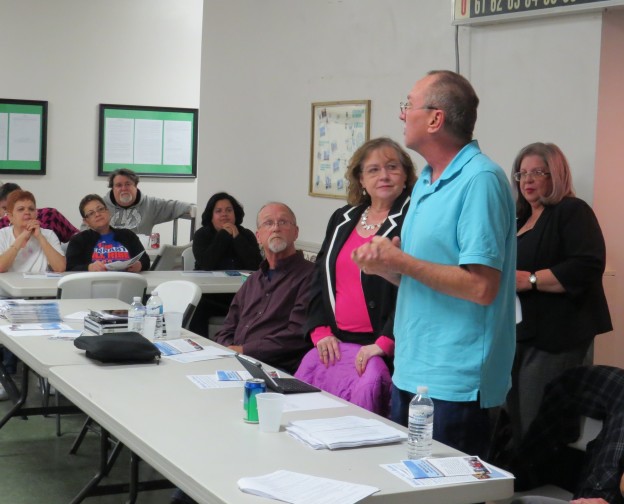
MHAction July 2016 Newsletter
MHAction becomes an independent project
We’re excited to announce that on May 1st MHAction became an independent project! This new stage in the project’s development will allow us to continue building a national movement of manufactured homeowners, committed to fighting for their communities and their neighbors.
MHAction’s new fiscal sponsor is the SocialGood Fund.
Stay tuned over the next few months as we announce a new logo and branding.
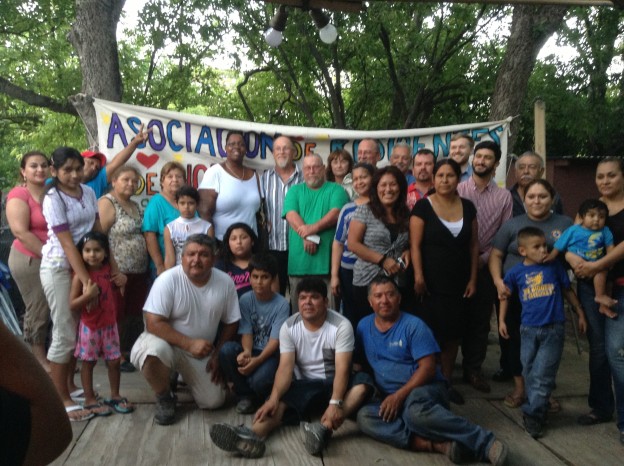
MHAction 2015 Year in Review
Click here to see MHAction’s Year in Review: Taking Action, Building Power and Securing Victories!
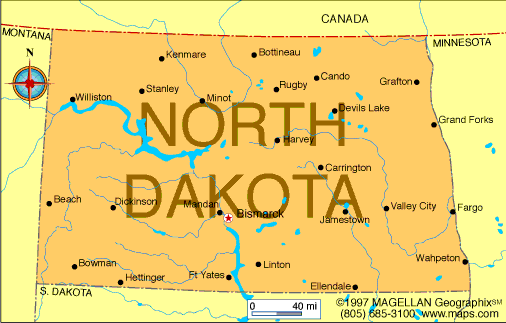
Release: Seniors, Manufactured Home Owners Gather to Further Develop Housing
For Immediate Release – February 17th, 2015
Contacts: Barbara Vondell 701-651-4050
Richard Robinson 801-690-1866
Seniors, Manufactured Home Owners Gather to Further Develop Local and Statewide Housing and Economic Justice Campaigns
Williston, ND – Amid growing concerns involving access to affordable housing in the Williston area, national community leaders from the states of Washington, Utah, Montana and Massachusetts will visit Williston to assist local renters, homeowners and manufactured housing residents to develop local and statewide campaigns designed to protect and strengthen affordable housing options for local residents.
The visiting community leaders hail from MHAction, a special project of the Center for Community Change. MHAction is a growing national movement of manufactured home owners who engage in public policy issues that address their interests and concerns as homeowners on the local and state levels, as well as larger issues of retirement and economic security on the national level.
“Our goal is to build economic justice campaigns designed to protect and enhance the economic and retirement security of manufactured home owners,” stated Richard Robinson, a MHAction representative from Farr West, Utah. “Our communities are feeling the pressure of what, in our opinion, are predatory equity schemes by large, out of state corporations that are preying on the most vulnerable in our society, especially seniors.”
Land-lease manufactured housing communities, where home owners rent the land their homes sit on, are becoming increasingly out of reach for many Williston families. Many of the manufactured housing communities in the Williston area are now owned by out-of-state real estate investment corporations, like ReNue Properties. These companies have come under fire in recent months for what many residents claim are arbitrary rent increases that are coupled with decreased capital improvements.
“We have seen our rents triple in many of the communities in the Williston area,” cited Barbara Vondell, a local community leader that has been pushing for changes to protect local homeowners. “Now is the time for our community to come together and directly engage corporations that are simply pushing for outrageous profits on the backs of our seniors and low-income workers. We’re really looking forward to next week’s meetings in our effort to make important issues like this front and center in our community.”
Who: Williston Area Manufactured Home Owners
What: Issues Forum and Community Training Session
Where: Williston High School Cafeteria, 502 West Highland Drive
When: 2 Repeat Sessions, February 26th and 27th at 7pm

Listen to the August 12 MHAction Community Call
In case you missed it you can listen to the audio recording of our August 12 Community Call
Includes commentary by:
**Richard Robinson, Pam Bournival and Jesse Martinez (from the MHAction leadership team)
**Renaye Manley, expert on public pension funds and corporate campaigns
Take the post-call survey here: http://www.anymeeting.com/SYID=E054D8848446

MHAction leader responds to “The End of Retirement”
Pam Bournival of Sarasota, Florida had this to say about the recent Harper’s Magazine article “The End of Retirement”
Jessica,
Your article, The End of Retirement, was a very interesting read especially since we hear almost similar stories quite often from homeowners who live in manufactured home ground rent communities. Everyone is searching for “community”, and many find it in manufactured home communities. Especially disconcerting is the way potential homeowners are enticed into the community and then they are hit with exorbitant rent increases, sometimes the very next year after moving in, along with limited maintenance and capital expenditures. The land owners, some of whom are large REIT’s answering to shareholders (many mutual funds) wanting ever increasing dividends, do just enough to make that quick first impression enticing. And they take full advantage of the fact that people do not check the fine print before signing on that dotted line. We want to believe in people, to trust people, to take them at their word . . . and then we learn the only thing which counts is what is in writing. Increased rent for new homeowners makes it all but impossible for existing homeowners to sell for even a fraction of their home’s value. When the rent is going to be so high, buyers won’t pay anything for the house.
People who have lived in a community for years or decades have seen their rents increase to such a level that it is no longer affordable. They are threatened with eviction and lawsuits, which furthers their nervousness about their future. After possibly spending many months deciding whether to pay rent or buy food or buy medicines, the brave ones just turn in the keys to their beloved home and walk away, sometimes to family and sometimes to who knows what? It could be that first step towards an RV in the desert.
You mention Social Security as a supplement to retirement. Alas, with the many pension funds decimated by greed and savings wiped out by Wall Street shenanigans, this leg of the stool is often all that is left to even the best of planners. We as a nation must stand up and speak out for doing what it takes to honor our elders and make sure they have safe, clean living environments. Social Security and Medicare need to be expanded to ensure this.
Monique Morrissey hit the nail on the head when she said that we have a reversal in economic security. Every parents’ dream is to see their children do better than they did and to not have to ask for anything from their children. What is wrong with America’s picture when so many of our precious elders are left out in the cold, in many cases quite literally?
And what does this say about corporate greed when they are presenting at conventions and gatherings where they know many of our elders will be, offering jobs which require heavy labor and offer minimal benefits? We should all feel so ashamed that we stand up in a unified voice to say it is not enough to offer aspirin so they can continue to work!!!
You cover the history of “retirement” and the belief when Social Security was initiated that many people would die before collecting. Now that we know many live well beyond the 65 years originally envisioned, more must be done to care for the retirees or our country. It is not enough to extend the age when a person can collect full benefits.
Teresa Ghilarducci states our retirees are woefully underfunded; they have small budgets for food. How healthy can they be eating? What are we as a nation going to do about this? We may believe that everyone should have planned better, but the truth of the matter is, it is so much more complicated than that. We have been in touch with the Senate Special Committee on Aging regarding the plight of manufactured homeowners and we are hoping for hearings about our issues. We must expand these hearings. We must hear from manufactured homeowners and recreational vehicle homeowners.
We invite you to hear our stories. We look forward to hearing from you. In the meantime, check out mhaction.mstudio.com and “like” us on Facebook.
Pam Bournival
Sarasota, Fl.

Legislative Report on Victories in Delaware
Community leaders in Delaware would like to take this moment and share our analysis of the 2014 Delaware legislative session in which a number of manufactured housing issues were advanced. We are hoping that by sharing this analysis and the lessons learned that a movement to push for the economic and retirement security can continue to grow and expand.
Legislative Agenda for 2014
In 2013, homeowners in Delaware were successful in getting passed into law SB-33, a rent justification bill, based on the CPI-U rate in our area of the country. While far from perfect, it is a big step in the right direction to bring a measure of fairness and balance to homeowners living in leased land communities.
Since this was a major issue that literally took years to bring to fruition, our legislators requested that for the second half of GA Session 147 in 2014, we limited our agenda to bills from last year that were carried over along with several “clean up” bills which we were assured “would be simple to get through”. Unfortunately, we all know that with manufactured housing issues nothing is ever simple and we have experienced the usual difficulties. The following four bills passed the House and the Senate this session:
* HB-233 – This was a clean-up bill for DEMHRA (DE Manufactured Housing Relocation Authority) who is charged with the oversight of the rent justification program.
* HB-106 w/A (Right of First Offer changes – revisions requested by the Attorney General’s office) – This bill extends the time frame of a HOA’s alternative purchase offer so that it remains valid for 6 months. If the community is still for sale after the initial 6 month period, the HOA can refresh their alternative offer, and such offer will be valid for another 6 months. The HOA can refresh their offer every 6 months up to 18 months. The bill further permits a HOA to amend its alternative offer at any time and allows a HOA to match a third party’s lower price offer and all of the material terms and conditions of the lower offer.
* HS-1 for HB-234 (Clarifies DEMHRA abilities to regulate their new responsibilities) – SYNOPSIS – This bill: (1) Provides clarification for how market rate is based and must be documented; (2) Allows DEMHRA to request a list of affected homeowners; (3) Provides that community owners proposing increases above the CPI-U should suggest to DEMHRA a date, time and place of a meeting and the Authority shall affirm that meeting if it finds it to be reasonable; (4) Allows homeowners or a homeowners association on behalf of a homeowner to file for arbitration if no agreement is reached at the informal meeting; (5) Makes a technical change to the effective date of Senate Substitute NO 1 to Senate Bill NO 33 of the 147th General Assembly.
* SB-238 – A true “consensus bill” crafted by members of the homeowners groups and the landowners groups, it addresses the disclosure problem (transfer of lease will remain as currently established with option the choice of the seller). This legislation will require manufactured home community owners to provide prospective tenants with a copy of the proposed rental agreement, a copy of the rules, standards and fee schedule of the manufactured home community, a copy of the Manufactured Home Owners and Community Owners Act, and a summary of the Act written by the Attorney General at the time the prospective tenant obtains an application for tenancy in the community, to ensure that prospective tenants have ample time and opportunity to review the documents prior to entering the community.
Moving Forward:
In 2015, we’ll be pushing for some very needed changes that include: 1) strengthening and clarifying our state’s ‘Tree’ law to ensure that community owners are responsible for the care and maintenance of trees from root to branch, 2) ensuring that enforcement of standards on upkeep are fair and reasonable and take into account the age and value of the home and 3) that homeowner insurance products are accessible and affordable for all in order to protect our investments.
Closing:
All of the above and more are indicative of our desperate need for a State Agency to oversee manufactured housing and the wide variety of issues involved. In Delaware, the Consumer Protection Unit of the Attorney General’s office is charged with our protection. We have had 12 attorneys in that position in the last 12 years – this is simply not acceptable. Retaliation is occurring in many communities, leases are rolling over with serious questions left unanswered, the list goes on and on. We view many of these cases as wide spread senior abuse since so many of those affected are in that category.
Again, what we do have access to is taking these lessons and fighting on to ensure that the retirement and economic security of manufactured homeowners are protected and strengthened. If you would like further information, please don’t hesitate to reach out.
Bobbie Hemmerich on behalf of the Delaware Advocacy Team
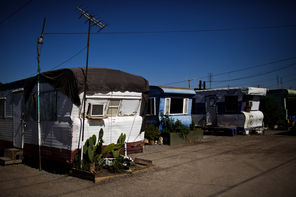
Investors bet on trailer parks for double-wide returns
Originally published in the Seattle Times Thursday, June 5, 2014
With more of the middle class sliding downward and many towns banning new trailer parks, enterprising owners are getting rich renting the concrete pads and surrounding dirt on which residents park their homes.
Bloomberg News
When Dan Weissman worked at Goldman Sachs Group and, later, at a hedge fund, he didn’t have to worry about methamphetamine addicts chasing his employees with metal pipes. Or SWAT teams barging into his workplace looking for arsonists.
Both things have happened since he left Wall Street and bought five mobile-home parks: four in Texas and one in Indiana. Yet he says he’s never been so relaxed in his life.
The University of Michigan economics graduate attributes his newfound calm to the supply-demand equation in the trailer-park industry. With more of the U.S. middle class sliding downward and many towns banning new trailer parks, enterprising owners are getting rich renting the concrete pads and surrounding dirt on which residents park their homes.
“The greatest part of the business is that we go to sleep at night not ever worrying about demand for our product,” Weissman says. “It’s the best decision I’ve ever made.”
Better yet, Weissman says, the field isn’t packed with the hyper-driven geeks and MBAs who crowd technology and finance in the San Francisco Bay Area, where he and David Shlachter, his business partner and brother-in-law, both live.
“You’ve got a lot of really smart people trying to come up with a better way to put a calendar on an iPhone,” says Shlachter, who has a master’s degree in development economics from Harvard’s Kennedy School of Government. “We’d rather sit at a different poker table, where none of those people dare to go because it doesn’t sound good at a cocktail party.”
Weissman and Shlachter are part of a white-collar exodus to rougher industries, as investors seek yield amid chronically low rates or steady income after being cast out from finance or law.
In 2009, Ed Vasser left his job at a hedge fund and started investing his own capital in a wide range of down-and-dirty investments, including subsidized housing, storage units and tax liens. He’s buying part of a truck wash.
“I like to say I turned in my Rolex for a pinkie ring,” Vasser says.
The economics of mobile homes are particularly alluring to folks who’ve made their living in the markets. Many counties in the U.S. have banned or discouraged new trailer parks because the inhabitants pay little in taxes and drain resources. Yet demand is higher than ever, investors say, because so many people never got back on their feet after the recession.
David Protiva, a former mortgage-backed-bond salesman, now owns four trailer parks in Georgia. He’s noticed that until 2008, most people coming into his parks were moving up; they owned nothing before buying a trailer. Since 2009, half his residents have come to him from conventional homes, he says.
Roughly 6 percent of Americans lived in mobile homes in 2012, according to the U.S. Census Bureau. Until recently, billionaire Sam Zell and a few other investors had the market to themselves.
“We like the oligopoly nature of our business,” Zell said on a 2012 analyst conference call for his Equity Lifestyle Properties, which owns 71,500 trailer sites.
Warren Buffett targeted the industry more than a decade ago when he purchased Clayton Homes, the largest manufacturer of mobile homes. Now, private-equity firms are starting to prowl the parks.
Carlyle Group bought two in Florida in October for a combined $31 million. Both are high-end senior parks, where tenants must be 55 or over, and one is just steps from the Atlantic.
The new tycoons in the business are professionals like Weissman and Shlachter, who are willing to buy smaller, sometimes squalid parks, where tenants have damaged credit and maybe criminal records.
The sellers are often mom-and-pop owners who set up the parks in the 1960s and 1970s and have little incentive to improve them because tenants can’t afford to leave. One Colorado owner bragged to Shlachter about never plowing the snow, which saved him money.
“It’s hairy, and it’s colorful, and it’s sometimes scary,” Shlachter says.
Weissman and Shlachter take pride in improving the lives of residents in some of the more rundown parks they’ve bought. And they say owning trailer parks has taught them what it’s like to be low income in America.
Many tenants can’t get bank accounts because they have wretched credit. Instead, they use prepaid debit cards that charge a fee of as much as $4 to load just $20 onto them.
“It’s expensive to be poor,” Shlachter says.
The biggest eye-opener, they say, has been finding so many capable people banished to poverty by a stupid mistake, like getting busted for drugs. Weissman and Shlachter hire those people as managers, with, they say, excellent results. They give them incentives for collecting 100 percent of the rents on time and for finding tenants for vacant sites.
Frank Rolfe and his partner, Dave Reynolds say the 20 percent return many parks throw off annually is enough to get the genteel set over the idea of owning a community of double-wides.
Rolfe and Reynolds own 100 parks in 16 states and also run the Mobile Home University, an academy that holds three-day boot camps for aspiring trailer lords for $1,999 a person. Rolfe says an increasing number of his students are bankers and engineers.
The beauty of a trailer park for its owner is that once a tenant trucks a home to a site, then lowers it onto a pad and hooks up to the electricity and septic systems, he’s unlikely to leave. It costs at least $5,000 to move a home, a sum that trailer dwellers rarely accumulate more than once, Rolfe says.
“We’re like a Waffle House where everyone is chained to the booths.”
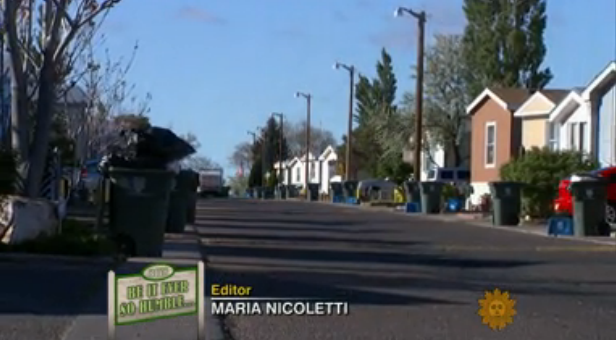
Reaction to CBS report on manufactured housing
“A golden opportunity for an increase of affordable housing is being lost to corporate greed”
Watch the video below from CBS about manufactured housing in America.
No matter what income level one enjoys, there is no question that people choose to live in manufactured home communities for just that . . . the sense of community. However, we are dismayed that the only communities shown in this report are one with hitches still on the home and one facing the Pacific Ocean. Neither of these are typical. What is typical is a community filled with homes secured into the ground, hitches removed and finishes such as carports, screen rooms and utility/storage rooms. Unfortunately, what is also typical is community owners increasing the ground rent unconscionably so that these good, hard working home owners and retirees are forced out of their home and lose their equity because the cost of owning a home and also paying ground rent becomes un-affordable. What could be a golden opportunity in this country for an increase of affordable housing in community settings is being lost to corporate greed.
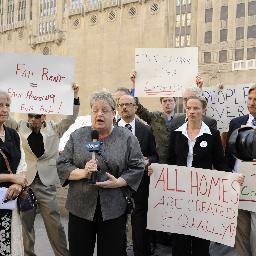
Manufactured Home Owners Attend ELS Shareholders Meeting to Cite Concerns
For Immediate Release: Monday, May 12, 2014
Contact: Kevin Borden, kborden@communitychange.org, (202) 360-8876
Equity LifeStyles Properties, Chairman Sam Zell, Face Increased Scrutiny Over Risky Business Practices
Manufactured Home Owners Will Attend Shareholders Meeting to Cite Concerns
(CHICAGO)— Equity Life Styles Properties (ELS), a Real Estate Investment Trust (REIT), and the nation’s largest corporate owner of manufactured home communities is holding its shareholders meeting on Tuesday amid increased scrutiny of both their management practices and of recent statements made by its chairman, Sam Zell. Manufactured home owners from ELS communities in seven states, many of whom are seniors living on fixed incomes, will be attending the shareholders meeting where they will bring their grievances directly to ELS’ Board of Directors.
ELS currently owns 380 manufactured home communities in 32 states. These are land-lease communities in which the REIT (ELS) owns the land under the homes, which are not mobile. ELS has been facing criticism due to large rent increases coupled with decreased maintenance. This double whammy undermines the affordability of ELS communities and destabilizes these properties as long-term real estate investments. ELS recently faced a $111 million verdict in Santa Clara County, California for breach of contract, negligence and nuisance for failing to maintain one of its manufactured home developments.
“The Santa Clara County decision adds proof to the claim that ELS’ business practices are putting the health of our communities at risk. Our retirement security and home equity are being ravaged by ELS,” stated Richard Robinson, a senior who resides in an ELS-owned community in Farr West, Utah. “I’m coming to Chicago to ask ELS why they are continuing to push our rents through the roof, while at the same time allowing our community’s infrastructure to fall to pieces. In my opinion, this risky business model is putting our families’ and our communities’ financial well-being in jeopardy.”
Zell is also facing a petition drive calling for his removal as ELS chairman. The petition has garnered thousands of signatures due to his recent disparaging comments made about the work ethic of those not in the top 1% income bracket in the country in a TV interview.
“It is infuriating that someone who makes millions off of monthly rents paid to his company by seniors who worked their entire lives and who are living on Social Security is questioning our work ethic,” added Pam Bournival, a home owner in an ELS Community in Sarasota, Florida. “ELS should view these comments as an embarrassment to their customer base. We feel it is in the best interests of shareholders to avoid risk posed to ELS’ marketability and ask for Mr. Zell to step down as Chairman of ELS.”
Manufactured home owners involved with MHAction, a project of the Center for Community Change Action, have called on ELS, and other REITs to re-evaluate their business models and management practices. MHAction community leaders believe the path forward for ELS and other REITS is to put in place long term lease agreements that outline a fair and balanced rent increase and capital improvement process. MHAction is also calling for ELS’s principals to support America’s retirement systems of Social Security and Medicare that the vast majority of their customers rely upon.
###
To find out more about MHAction, please visit: mhaction.mstudio.com
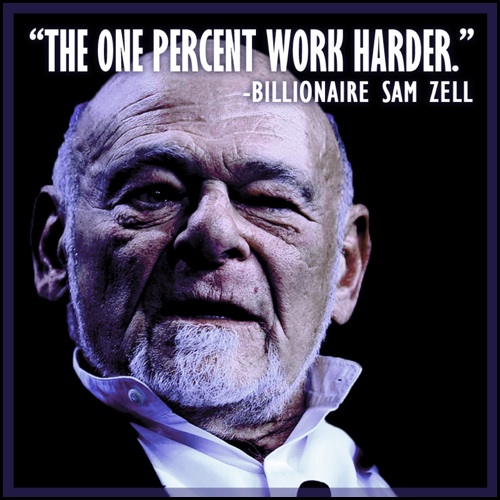
Release: Manufactured Homewners Call ELS to Oppose Zell Election to Board
For immediate release – February 7, 2014
Manufactured Homeowners Call Upon Shareholders of Equity Lifestyle Properties, Inc. to Oppose Sam Zell’s Election to Board of Directors
Citing disparaging remarks made about ELS’ Customer Base, Homeowners petition shareholders to oust Zell
Sam Zell: “1 Percent Earn More Because They Work Harder”
Contact: Kevin Borden, Senior Organizer
Contact Info: kborden@communitychange.org, 202-360-8876
Washington, DC – A coalition of seniors, veterans, people with disabilities and young families who reside in manufactured home communities owned and operated by Equity Lifestyle Properties, Inc. (ELS) are angered by disparaging comments made by company chairman Sam Zell about Americans who are not part of the richest 1%. On February 7 they launched a petition calling for Zell’s resignation as chairman of ELS after comments Zell made earlier in the week during an interview with Bloomberg News in which he declared that “The 1 percent work harder. The 1 percent are much bigger factors in all forms of our society.” You can watch the full quote here:
“Sam’s comments divide us further as a country. They do not bring us together to solve the important issues of economic inequality that affect every segment of our society,” stated Dale Muzzy of Daytona Beach, Fla., and president of the Carriage Cove HOA, an ELS-owned community. “I’ve worked extremely hard for decades at DHL and also became a full-time caregiver for my wife who was in a debilitating motorcycle accident. So I’m puzzled as to how Zell’s background qualifies him to know how hard I’ve worked.”
ELS is the nation’s largest corporate owner of manufactured home communities with 380 manufactured home communities (defined as land-lease communities) in 32 states. ELS serves over 140,000 homeowners, many of which are retirees and seniors living on fixed incomes.
“It is infuriating that someone who makes millions off of monthly rent paid by seniors is questioning our work ethics,” added Bobbie Hemmerich, a homeowner from an ELS Community in Lewes, Del. “ELS should view these comments as an embarrassment to their customer base. That’s why we launched a petition demanding Sam Zell’s ouster from the ELS board.” The text of the petition can be found here: http://act.retirementsecurityvoices.org/petition-zell
Manufactured homeowners across the country are banding together and calling upon ELS to re-evaluate its business model and management practices. Homeowners believe that a sensible alternative model for ELS is to put in place long-term lease agreements with fair and balanced rent increases and capital improvement processes. Additionally, ELS would be able to engender a higher level of customer loyalty by pushing for policies that protect and strengthen our nation’s Social Security and Medicare systems and ensuring that its chairman stop making disparaging statements.
For more information go to http://mhaction.mstudio.com or contact Kevin Borden at 202-360-8876 to set up interviews with manufactured homeowners who are leading the campaign.
###
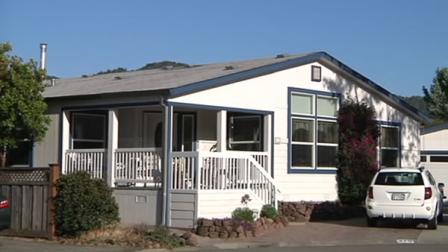
Supreme Court upholds San Rafael rent control
SAN RAFAEL, Calif. (KGO) — The United State Supreme Court has affirmed a major victory for California mobile home owners protected by rent control.
ABC7 News has been following this case closely for the past five years, focusing on the Contempo Marin mobile home park in San Rafael. The park owner, Equity Lifestyle Properties, sued the city of San Rafael, claiming its rent control law for mobile homes was unconstitutional.
After a long legal battle, the Supreme Court has now refused to hear an appeal in the case. That means San Rafael’s rent control stands.
The decision is expected to protect mobile home residents in about 100 California cities and counties with similar rent control laws.

Senior citizens protest outside Vero Beach retirement community
From WPBF News
VERO BEACH, Fla. —Dozens of residents at a retirement community in Vero Beach took to the streets Tuesday morning to protest along State Road 60.
They said they’re fed up because the clubhouse and streets are not properly maintained.
Cheryl Condo has lived at Countryside at Vero Beach for nine years. She said the 33-year old tennis court has cracks everywhere, while some of the pool furniture is broken and covered in black mold.
Condo said the property managers aren’t helpful.
“And when we tell them about things that need (to be) fixed, they go, ‘Too bad, we don’t have no money,'” Condo said.
Condo moved to the community nine years ago. She said it had beautiful landscaping and fantastic amenities to compliment the community’s 600 manufactured homes.
But she noticed the change a few years ago. Condo said residents pay about $300 to $800 in lot fees each month, but very little of the money is used to maintain the community.
Ed Nelson has lived at Countryside for 31 years. He said everything used to be included in the monthly fee, but now they have to pay for water, sewer and trash separately.
“They picked us so clean that even the buzzards won’t stop here,” Nelson said.
Resident said they will continue to protest until there’s a change.
The property is owned by Equity Lifestyle Properties. A spokeswoman from the Chicago office told WPBF 25 News in a written statement that the company’s “rents are in line with the market and have been agreed to by the community homeowners association on behalf of the residents.” She said the management team regularly meets with residents to hear their concerns, and improvements to the tennis and shuffleboard courts are “planned for the coming year.”

Retiree turned activist shows you can make a difference
From the Cape Gazette
By Don Flood | Oct 29, 2013
Like many others before her, Bobbie Hemmerich retired here to enjoy the Cape Region’s chief attraction.
“I came down here with the idea of being able to walk the beach,” said Hemmerich, a lifetime “Jersey girl” who moved to Lewes in 2000. “New millennium, new life, new state – high hopes.”
It didn’t turn out that way.
“Both my knees went bad. I had double knee replacement and then I had complications,” Hemmerich said. “So I still can’t walk the beach.”
In some ways, her retirement plans didn’t work out any better than her knees. Instead of peacefully enjoying life, Hemmerich became an activist, with her main issue being the rights of manufactured home owners.
That’s a particularly important cause in Sussex County. Statewide, Delaware’s housing stock is about 10 percent manufactured housing. In Sussex, according to a 2008 study by the Delaware State Housing Authority, that percentage rises to about 25 percent.
Here’s another factor. According to that same study, about 57 percent of those manufactured home owners don’t own the land beneath their houses. They lease it, which makes them vulnerable to rapidly rising rent increases.
Before we go further, let’s clear up a common misconception about what are sometimes called “mobile homes.” They aren’t mobile. Not most of them.
Historically, yes. “The older ones were brought in on wheels and put on cinder blocks,” said Hemmerich. “But the newer ones, most of them, are being put on foundations.”
And, effectively, many of the older ones can’t be moved either. “Mine is a prime example,” said Hemmerich, whose home was built in 1976. “It has a stick-built addition … It has a deck. And if you tried to pull it out, it would probably fall to pieces.”
It gets worse. Even if it could be moved, there’s no place to go. “Any community that has open spaces will not accept anything older than five years old,” Hemmerich said. “And some of them now are saying only new. So where are you going to take it?”
Hemmerich bought her home, as she recounted in a 2004 letter to the Cape Gazette, because the neighborhood was clean, quiet, private, east of Route 1, and “it was affordable.”
But, like many others, she bought without being fully aware of the risks.
Despite being represented by an attorney, she was unable to get a copy of the lease. There was always some excuse. The fax machine was down, the computer was down, it was in the mail, etc.
“We didn’t get to see our lease until an hour before closing,” she said. “It was 27 pages … You can’t even read it. You kind of look through it … You’re stuck.”
Still, things seemed OK at first. Once-a-year rent increases were limited to 5 percent, and the monthly fee included water, lawn maintenance, trash collection and snow removal.
In 2003, everything changed. The company that owns her park, which now goes by the name Equity LifeStyle Properties, went to court to end the rent caps and won. Later, the Delaware Supreme Court affirmed the lower court’s ruling.
Manufactured home parks could still raise rents only once a year, but the limits were removed. On Nov. 1, 2003, Hemmerich received a letter from the company: In two months, her rent would jump from $275 a month to $320 – 16 percent. For a woman surviving on Social Security checks, that was a life-changing amount. (There were also hidden rent increases. Water usage, once part of the package, was removed, she said, and now has to be paid separately.)
And that’s when mild-mannered-retiree-turned-activist Bobbie Hemmerich first started work on a rent justification bill. This past session, 10 years later, the General Assembly finally passed Senate Bill 33, which was signed by Gov. Jack Markell June 30.
It wasn’t just Hemmerich by herself, of course, but she played an important role. According to Mitch Crane, chair of the Delaware Manufactured Home Relocation Authority, “Bobbie is one of the unsung heroes. Her efforts and tenacity, along with that of so many manufactured home owners, resulted in the rent justification law being passed after many previous attempts failed.”
According to the bill, rent increases are tied to the three-year average of the Consumer Price Index for all Urban Consumers. Park owners who want to raise rents more than that average must go through mediation and non-binding arbitration, appealable to Superior Court.
The bill doesn’t accomplish everything Hemmerich wanted, but it’s a start. A future column will discuss the legislative priorities of the Land Lease Homeowners Coalition, of which Hemmerich is a board member.

Residents protest rent increases at community for seniors
From Fox13 in Utah
FARR WEST, Utah – Utahns protested in Farr West on Saturday in response to increasing rent costs at a manufactured home community for seniors.
Protesters said many residents of Westwood Village, 1111 North 2000 West, are on fixed incomes and will not be able to continue living in their homes if the community keeps increasing their rates.
Resident Chris Hicks said her ground space rent has increased every year since 2008, which is when she moved in. She said she is keeping up for now, but she said she and other residents are concerned about what the future may hold.
“I’m starting to feel the squeeze with the ground increase,” she said. “I keep thinking, I’m a young person in this park, I’m 56 years old. What’s gonna happen in 30 years from now? I plan on staying here that long, as long as some of these other people. What’s gonna happen then?”
The owner of the complex, Equity Lifestyles Properties, is one of the largest owners of manufactured home communities in the nation. FOX 13 News attempted to contact them for comment regarding Saturday’s protest but did not hear back.
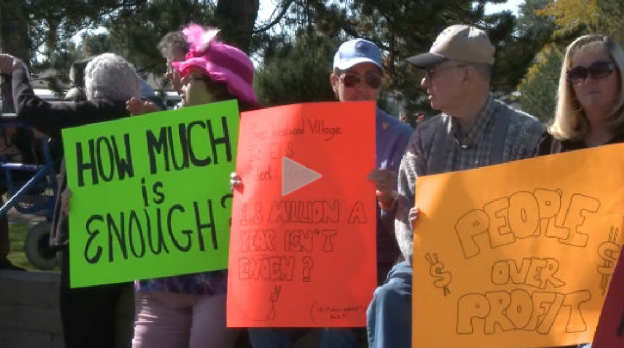
Farr West senior homeowners protest rent increases
From the Standard Examiner
FARR WEST — Carrying signs and armed with determination, residents of the Westwood Village active senior home community staged a rally Saturday, protesting rent increases they say threaten their economic security.
Richard Robinson, the community’s homeowners association chairman, said monthly rent has increased nearly $200 in the last decade, since Equity Lifestyle Properties purchased the community. According to a Westwood Village news release, the monthly rate will be raised $21 to $432 next year, up from $382 in 2010 and $249 in 2002.
Since many of the residents of the community, at 1111 N. 2000 West, have fixed incomes — often based on Social Security — the yearly rent hikes have priced some people out of their homes, Robinson said. One resident who spoke at the rally said that at age 72, she’s even had to go back to work just to keep her home.
“Many people have left Westwood, walking away from their homes.” Robinson said. “They couldn’t sell them or pay rent.”
While the rent increases would be tough to swallow under any circumstances, the protesters claimed ELS has not used the money appropriately, to maintain or improve the community, instead pocketing the profit. Robinson cited the example of the community’s sewer system, which he said is in such disrepair that it needs complete replacement.
Connie Waite said that when she moved in seven years ago, ELS agreed to fix her driveway, a promise that has gone unfulfilled. Many others at the protest shared similar concerns about the lack of return on their rising housing costs.
“For them to keep increasing the cost is really putting (a strain) on us,” Waite said. Myra Close, treasurer of the National Manufactured Homeowners Association, said price increases like the ones at Westwood Village are happening at communities owned by ELS all across the country. Many of those communities also held protests Saturday, a date that coincided with ELS Chairman Sam Zell being slated to speak over the weekend at a manufactured housing forum in Chicago.
Holding a sign that asked “How much is enough?” Annette Tittenser accused Zell of taking advantage of the people who live in the hundreds of communities across the nation ELS owns.
“Sam Zell touts himself as a great mogul with real estate developments,” she said. “But he makes his profit off peoples’ Social Security.”
Close said she’d love to discuss the issues with ELS, but so far attempts to do that have been met with resistance.
“We want to be able to sit down with ELS and talk with them,” she said. “We haven’t been able to do that.”
Calls to ELS seeking comment were not returned Saturday.

Manufactured Homeowners Draw Attention To Attacks On Retirement Security
For immediate release – October 16, 2013
Thousands of Manufactured Homeowners Across the Country Draw Attention To Attacks On Their Retirement and Economic Security
Homeowners Call Upon Sam Zell, Chairman of Equity Lifestyle Properties, Inc. (ELS), to Stop Economically Ravaging Their Personal Savings and Economic Security
Contact: Kevin Borden, Center for Community Change (202) 339-9356
Washington, DC – This week, manufactured home owners across the country are posting “For Sale: Our Economic and Retirement Security” signs on their homes. The signs are designed to draw attention to the devastating impacts that ELS’ exorbitant rent increases and lack of attention to needed capital improvements have had on thousands of manufactured homeowners’ economic and retirement security. Events across the country are being held to coincide with the Manufactured Housing Institute’s Fall Leadership Forum that is taking place in Chicago from October 16th to 18th. Sam Zell, Chairman of ELS, is the keynote speaker. Homeowners are posting pictures of those events and For Sale: Our Economic/Retirement Security at the following site: http://mhaction.tumblr.com/
ELS is the nation’s largest corporate owner of manufactured housing communities. ELS owns 380 manufactured housing communities (defined as land-lease communities) in 32 states. ELS markets to retirees, and many homeowners in its developments are seniors living on fixed incomes. ELS has come under scrutiny for undermining the retirement security of thousands of those seniors by drastically increasing rents, causing economic eviction, and being insensitive to the needs of the mostly elderly homeowners living in ELS-owned communities.
“I find it very troubling that Sam Zell is speaking at a manufactured housing forum entitled ‘Building a Vision For Our Future,” stated Bobbie Hemmerich, an ELS homeowner from Lewes, DE. “It appears to me that his vision is to force seniors and hard working families out of homes that they paid for while allowing our communities to deteriorate. That’s not a vision that is acceptable to us. A number of homeowners in our community have practically given their homes away due to poor business practices on the part of ELS.”
At MHI’s Fall Leadership Forum, community owners, like ELS, will be discussing a wide range of topics that include discussions on the future of the manufactured housing industry to exploring actionable steps that community owners can take to improve customer satisfaction.
“Living in Florida, it’s clear to me that some of the larger, corporate owners are not doing right by their customers, especially Sam Zell,” said Al Lynch, who lives in a community owned and operated by American Land Lease. “Our hope is that the large community owners don’t take a page out of ELS’ business model which seems intent on robbing seniors of a secure retirement. We need to show our support that all manufactured home owners are treated with dignity and respect.”
In response to ELS’ business practices and Sam Zell’s political contribution, ELS homeowners, supported by the Center for Community Change and the National Manufactured Home Owners Association, have launched a national campaign targeting ELS and Zell (you can learn more at http://mhaction.mstudio.com.).
The Center for Community Change (CCC) and the National Manufactured Home Owners Association (NMHOA) have called on ELS to re-evaluate its business model and management practices. CCC and NMHOA believe that a sensible alternative model for ELS is to put in place long-term lease agreements with fair and balanced rent increases and capital improvement processes. Additionally, ELS would be able to engender a higher level of customer loyalty by pushing for policies that protect and strengthen our nation’s Social Security and Medicare systems.
For more information go to http://mhaction.mstudio.com or contact Kevin Borden to set up interviews with ELS homeowners who are leading the campaign.
###
Founded in 1968, the Center for Community Change is one of the longest-standing champions for low-income people and communities of color. CCC seeks to confront the vital issues of today and build the social movements of tomorrow. For more information go to www.communitychange.org.
For decades, the National Manufactured Home Owners Association has represented seniors, veterans and the hundreds of thousands of Americans who live in manufactured housing communities. For more information go to www.nmhoa.org.

Homeowners Cite Sam Zell’s Ruthless Practices in Response to Glowing Forbes Article
For immediate release
September 23, 2013
Homeowners Cite Sam Zell’s Ruthless Practices in Response to Glowing Forbes Article
Growing movement confronting Zell-owned Company That Markets to Retirees
Contact: Kevin Borden, Center for Community Change, kborden@communitychange.org | (202) 360-8876
Sam Zell is currently featured as part of an in-depth cover story in Forbes Magazine portraying the billionaire investor as a shrewd risk-taker who is willing to take a few hits in the service of long-term profit. However, homeowners across the country are speaking up about Zell’s more insidious entrepreneurial endeavors. The article fails to mention some of Zell’s properties characterized by drastic rent increases, economic eviction, and complete insensitivity to the tough reality of the mostly-elderly residents.
Among Zell’s investments is Equity LifeStyle Properties, Inc. (ELS), the nation’s largest corporate owner of manufactured home communities. Zell is the board chair of ELS, which owns 380 manufactured home communities (defined as land-lease communities) in 32 states. ELS markets to retirees and many homeowners in its developments are seniors living on fixed incomes.
“ELS has been able to push its share value to an all-time high by gouging manufactured homeowners, combining rent increases with decreased community services,” said Pam Bournival, a homeowner in an ELS manufactured home community in Sarasota, Florida. “This is the real Sam Zell: a vulture capitalist unconcerned about actual people. Unfortunately, Forbes created a glowing portrait of Zell that betrays reality.”
In the last two years, Zell and ELS have faced increased scrutiny of the company’s management practices, including protests at recent shareholders’ meetings. In 2012 a group protested outside the shareholder meeting, questioning Zell over exorbitant and unfair increases in lot rents, and delivering a petition to stop economic evictions. The homeowners, supported by the Center for Community Change and the National Manufactured Home Owners Association, have launched a national campaign targeting ELS and Zell (you can learn more at http://mhaction.mstudio.com.)
Zell is also undercutting the economic security of seniors and people with disabilities by funding politicians and political action committees that are bent on dismantling the cornerstones of our nation’s retirement security programs: specifically, Social Security and Medicare.
“I was raised to believe that great business leaders had a moral compass and were supposed to make contributions to the broader society as a result of their success. With Sam Zell, it’s just the opposite,” said Bobbie Hemmerich, a homeowner from an ELS community in Lewes, Delaware. “Under his guidance ELS seems intent on robbing seniors – mostly women – of a secure retirement. To add salt to the wound, he gives big political contributions to politicians who want to gut Social Security and Medicare.”
The Center for Community Change (CCC) and the National Manufactured Home Owners Association (NMHOA) have called on ELS to re-evaluate its business model and management practices. CCC and NMHOA believe that a sensible alternative model for ELS is to put in place long-term lease agreements with fair and balanced rent increases and capital improvement processes. Additionally, ELS would be able to engender a higher level of customer loyalty by pushing for policies that protect and strengthen our nation’s Social Security and Medicare systems.
For more information go to http://mhaction.mstudio.com or contact Kevin Borden at (202) 360-8876 to set up interviews with ELS homeowners who are leading the campaign.
###
Founded in 1968, the Center for Community Change is one of the longest-standing champions for low-income people and communities of color. CCC seeks to confront the vital issues of today and build the social movements of tomorrow. For more information go to www.communitychange.org.
For decades, the National Manufactured Home Owners Association has represented seniors, veterans and the hundreds of thousands of Americans who live in manufactured housing communities. For more information go to www.nmhoa.org.